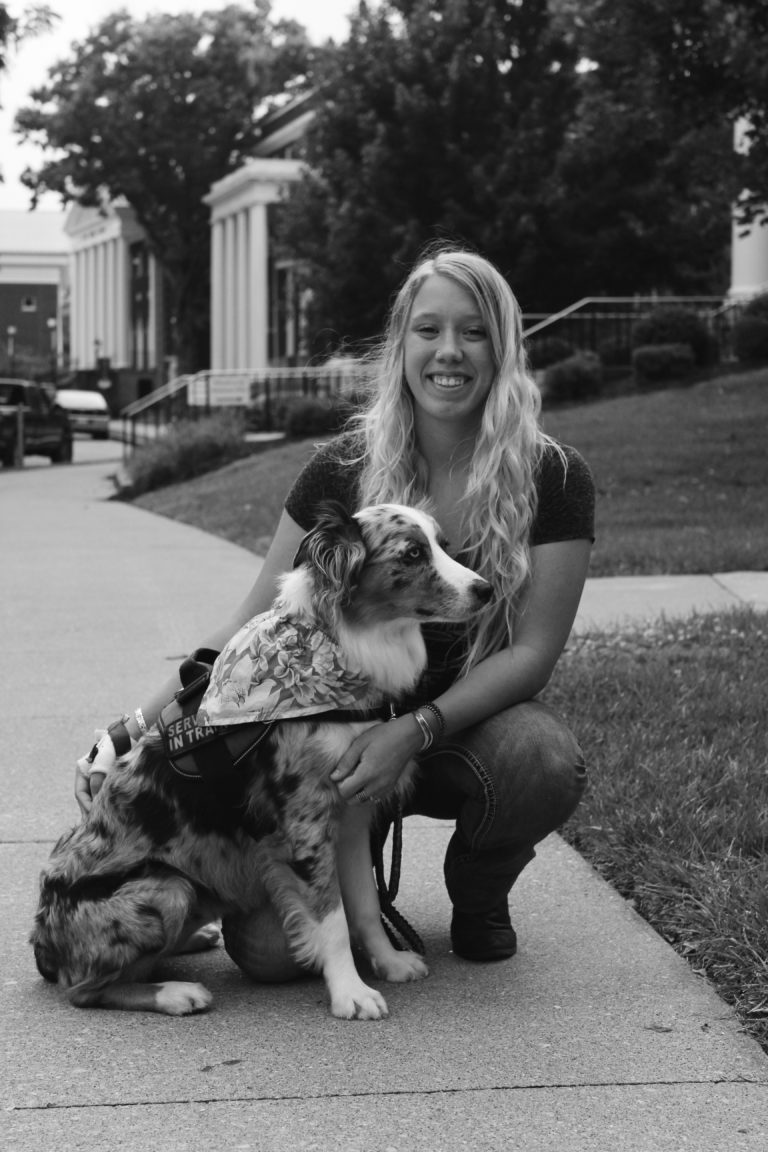By Delaney Tufts, Features Editor
Meet Kaiha Hovanec, an equine and psychology double major, and Kookie, her kooky Australian Shepherd. When Kookie was only ten weeks old, she and Hovanec were united full time. Kookie was the runt of the litter but as Hovanec said, “She was the alpha runt, so she beat up all her older brothers.”
Kookie, now a two-year-old service dog in training, is learning how to operate in a new environment. According to the Americans with Disabilities Act, a service dog is any dog that is individually trained to do work or perform tasks for the benefit of an individual with a disability, including a physical, sensory, psychiatric, intellectual or other mental disability. “Since she already knows far more than two tasks, she is a service dog,” Hovanec said. “But the training part is more of a social training. Generally, people shouldn’t be calling at her or getting her attention, but it’s always going to happen. She has to be able to focus on me through those situations and learn not to respond to others.” Hovanec’s command for Kookie to respond to people even when she isn’t in her vest: ‘Kookie say hi.’
When asked if people can pet Kookie, she said, “She can be pet when she doesn’t have her vest on. But I still want to be asked so I can give her my command. When her vest is on, it’s really distracting to have people try and get her attention.”
Although the two have a strong bond, it hasn’t always been so easy. Worried she wouldn’t bond with her dog or her dog wouldn’t be the right fit, she voiced her concerns to her breeder. The breeder told her if Kookie didn’t respond to her disabilities she could give the dog back and they would find her the right one. Looking back now, Hovanec feels that would have been too heartbreaking to do.
Hovanec has her service dog because of a hidden disability, rather than a visible disability. “I don’t look like I’m severely handicapped or anything in a physical way,” she said. “I get questioned a lot more and I get approached differently than if someone who did have a different disability were to get approached and questioned.” Hovanec said she has been questioned about her legitimacy, her papers and her certification many times. She has even been asked to leave certain places when she had Kookie with her. According to the Americans with Disabilities Act, staff cannot ask about the person’s disability, require medical documentation, require a special identification card or training documentation for the dog or ask the dog to demonstrate its ability to perform the work or task. They also cannot ask a person to remove his or her service dog from the premises, unless the dog is out of control and the handler doesn’t take effective action or the dog is not housebroken.
Hovanec would like others to know that just because someone doesn’t have a physical disability it doesn’t mean they don’t need assistance. “I want to further help the recognition that not all disabilities are [physically] recognizable, giving the examples of being deaf, diabetic, epileptic, autistic, having a brain injury, depression, anxiety, bi-polar [disorder], schizophrenia, etc.,” she said. “There are so many disabilities that are non-visible and sometimes I don’t think people think about that. They think, ‘I don’t see anything wrong with you; therefore, maybe you’re faking it.’ It’s like an iceberg: you’re only going to see this much and you have no idea what’s beneath the surface.”
Kookie is very special to Hovanec. “She, in all darkness, is my light,” she said. “She reminds me of God, definitely. There’s no way I would have gotten this dog and that she would have been so perfect unless God literally placed her in my life. I honestly don’t know what I would do without her.”




